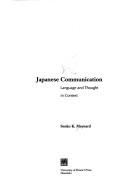| Listing 1 - 10 of 25 | << page >> |
Sort by
|

ISBN: 9027250367 1556192924 9027285845 9786613092687 1283092689 9789027285843 9789027250360 9781556192920 Year: 1993 Volume: vol 24 Publisher: Amsterdam Philadelphia J. Benjamins Pub. Co.
Abstract | Keywords | Export | Availability | Bookmark
 Loading...
Loading...Choose an application
- Reference Manager
- EndNote
- RefWorks (Direct export to RefWorks)
The emotional aspects of language have so far not received the attention they deserve. This study focuses on nonpropositional, i.e. expressive and interactional meanings of Japanese signs, with special emphasis on understanding their cognitive, psychological and social meanings. It shows how the Japanese language is richly endowed to express personal voice and emotive nuances, and confronts the theoretical issues related to this. The author proposes a new theoretical framework for Discourse Modality, a primary concern for Japanese speakers, to analyze the 'expressiveness' of language.
Japanese language --- Grammar --- Pragmatics --- -Japanese language --- -Koguryo language --- Discourse analysis --- Modality --- -Discourse analysis --- Koguryo language --- Discourse analysis. --- Modality. --- Japonais (langue) --- Discours

ISBN: 0521599091 0521590957 0511620977 0511836104 Year: 1998 Publisher: Cambridge Cambridge University Press
Abstract | Keywords | Export | Availability | Bookmark
 Loading...
Loading...Choose an application
- Reference Manager
- EndNote
- RefWorks (Direct export to RefWorks)
Principles of Japanese Discourse offers the first detailed description in English of the structure and rhetorical effects observed in various genres of Japanese discourse. Drawing on Japanese bunshooron and incorporating results of Western discourse studies, the book covers principles of overall rhetorical organisation including ki-shoo-ten-ketsu, topic structure, danraku, and sentence chaining, and presents a variety of rhetorical strategies frequently used in contemporary Japanese texts. After presenting these principles in thirty compact entries, Professor Maynard invites the reader to apply the knowledge gained to the comprehension of contemporary authentic Japanese text. Seven selected readings are presented with vocabulary lists, discourse notes, and other tasks. Translations are provided in the appendix. In this book Professor Maynard has created a new category in the area of Japanese language learning and provided an excellent reference source not only for students but for instructors of the Japanese language worldwide.
Japanese language --- J5280 --- J5416 --- Discourse analysis --- Rhetoric --- Japan: Language -- grammar -- semantics and rhetoric --- Japan: Language -- study materials -- conversation --- Pragmatics --- Arts and Humanities --- Language & Linguistics --- Discourse analysis. --- Rhetoric.

ISBN: 1282152939 9786612152931 9027292280 9789027292285 9781282152939 9027254028 9789027254023 9789027254023 Year: 2007 Publisher: Amsterdam Philadelphia J. Benjamins Pub. Co.
Abstract | Keywords | Export | Availability | Bookmark
 Loading...
Loading...Choose an application
- Reference Manager
- EndNote
- RefWorks (Direct export to RefWorks)
Using theoretical concepts of self, perspective, and voice as an interpretive guide, and based on the Place of Negotiation theory, this volume explores the phenomenon of linguistic creativity in Japanese discourse, i.e., the use of language in specific ways for foregrounding personalized expressive meanings. Personalized expressive meanings include psychological, emotive, interpersonal, and rhetorical aspects of communication, encompassing broad meanings such as feelings of intimacy or distance, emotion, empathy, humor, playfulness, persona, sense of self, identity, rhetorical effects, and so on. Nine analysis chapters explore the meanings, functions, and effects observable in the indices of linguistic creativity, focusing on discourse creativity (style mixture, borrowing others' styles, genre mixture), rhetorical creativity (puns, metaphors, metaphors in multimodal discourse), and grammatical creativity (negatives, demonstratives, first-person references). Based on the analysis of verbal and visual data drawn from multiple genres of contemporary cultural discourse, this work reveals that by creatively expressing in language we share our worlds from multiple perspectives, we speak in self's and others' many voices, and we endlessly create personalized expressive meanings as testimony to our own sense of being.
Creativity (Linguistics) --- Discourse analysis. --- Language and languages --- Japanese language --- Linguostylistics --- Stylistics --- Literary style --- Discourse grammar --- Text grammar --- Semantics --- Semiotics --- Creative ability (Linguistics) --- Linguistic creativity --- Competence and performance (Linguistics) --- Linguistics --- Psycholinguistics --- Style.

ISBN: 9027297371 1282254871 9786612254871 0585462585 9780585462585 9789027297372 9781588112026 1588112020 9789027251176 9027251177 Year: 2002 Publisher: Amsterdam Philadelphia J. Benjamins Pub. Co.
Abstract | Keywords | Export | Availability | Bookmark
 Loading...
Loading...Choose an application
- Reference Manager
- EndNote
- RefWorks (Direct export to RefWorks)
Linguistic Emotivity explores expressive and emotive meanings in Japanese from the perspective of the Place of Negotiation theory. The Place of Negotiation theory provides a framework for understanding how linguistic signs function in the place of communication (in cognitive, emotive, and interactional places). The theory finds the indexicality of a sign fundamental and views meanings as being negotiated among interactants who share not only information but, more significantly, feelings.Using analytical tools recognized in conversation and discourse analyses, the book analyzes emotive topics (vocatives, emotive nominals, quotative topics, etc.) and emotive comments (da and ja-nai, interrogatives, stylistic shifts, etc.) in contemporary Japanese discourse. It argues for the importance of emotivity in Japanese, in the context of the Japanese culture of pathos. Linguistic Emotivity challenges the traditional view of language that privileges logos, form, information, and abstraction, and instead, it proposes a philosophical shift toward pathos, expression, emotion, and linguistic event/action.
Emotive (Linguistics) --- Grammar, Comparative and general --- Japanese language --- Language and culture --- Pathos. --- Functional sentence perspective (Grammar) --- Predicate and subject (Grammar) --- Subject and predicate (Grammar) --- Theme and rheme --- Topic and comment (Grammar) --- Focus (Linguistics) --- Affective meaning (Linguistics) --- Emotive meaning (Linguistics) --- Semantics --- Connotation (Linguistics) --- Emotions --- Suffering --- Sympathy --- Topic and comment. --- Discourse analysis. --- Subject and predicate --- Syntax --- Pathos --- J5200 --- J5280 --- Topic and comment --- Discourse analysis --- Japan: Language -- grammar --- Japan: Language -- grammar -- semantics and rhetoric --- Affective and dynamic functions --- Pragmatics --- Sociolinguistics --- Psycholinguistics --- Emotive (Linguistics). --- Linguistics --- Philology --- Culture
Book
ISBN: 9027256683 9027267138 9789027267139 9789027256683 Year: 2016 Publisher: Amsterdam Philadelphia
Abstract | Keywords | Export | Availability | Bookmark
 Loading...
Loading...Choose an application
- Reference Manager
- EndNote
- RefWorks (Direct export to RefWorks)
Japanese language --- Conversation analysis --- Oral communication --- Popular culture --- Sociolinguistics --- Language and languages --- Language and society --- Society and language --- Sociology of language --- Language and culture --- Linguistics --- Sociology --- Integrational linguistics (Oxford school) --- Oral transmission --- Speech communication --- Verbal communication --- Communication --- Analysis of conversation --- CA (Interpersonal communication) --- Conversational analysis --- Discourse analysis. --- Social aspects --- Sociological aspects --- J5280 --- J5009 --- J4143 --- Japan: Language -- grammar -- semantics and rhetoric --- Japan: Language -- theory, methodology and philosophy --- Japan: Sociology and anthropology -- cultural trends and movements -- popular culture --- Sociology of culture --- Mass communications --- Pragmatics

ISBN: 9789027254023 Year: 2007 Publisher: Amsterdam Benjamins
Abstract | Keywords | Export | Availability | Bookmark
 Loading...
Loading...Choose an application
- Reference Manager
- EndNote
- RefWorks (Direct export to RefWorks)
Pragmatics --- Japanese language --- Creativity (Linguistics) --- Discourse analysis --- Language and languages --- #KVHA:Discourse analysis; Japans --- #KVHA:Stilistiek; Japans --- #KVHA:Taalkunde --- Linguostylistics --- Stylistics --- Literary style --- Discourse grammar --- Text grammar --- Semantics --- Semiotics --- Creative ability (Linguistics) --- Linguistic creativity --- Competence and performance (Linguistics) --- Linguistics --- Psycholinguistics --- Style
Book
ISBN: 9789004505865 9789004505858 9004505865 Year: 2022 Publisher: Leiden Boston
Abstract | Keywords | Export | Availability | Bookmark
 Loading...
Loading...Choose an application
- Reference Manager
- EndNote
- RefWorks (Direct export to RefWorks)
From the perspective of philosophical contrastive pragmatics, this study investigates our multiple selves as manifested in how we use language. Based on analyses of original and translation texts of Japanese and English literary works, the Japanese self is proposed as being fundamentally empty and yet richly populated with multiple subjective aspects, characters, and characteristics. Incorporating the concept of emptiness drawn from Japanese philosophical traditions and postmodernism primarily developed in the West, selves evidenced in grammar, style, and variation are investigated applying interpretive resources of linguistic subjectivity, character, and character-speak. Expressive gaps found in source and target texts across two languages lead us toward different ontological views, and guide us to engage in the rethinking of the concept of self.
Creativity (Linguistics) --- Discourse analysis --- Japanese language --- Japanese Linguistics --- Language and languages --- Style --- Self (Philosophy) in literature. --- Discourse analysis. --- Japanese Linguistics. --- Style.
Book
Year: 2016 Publisher: Amsterdam ; Philadelphia : John Benjamins Publishing Company,
Abstract | Keywords | Export | Availability | Bookmark
 Loading...
Loading...Choose an application
- Reference Manager
- EndNote
- RefWorks (Direct export to RefWorks)
Japanese language --- Conversation analysis --- Oral communication --- Popular culture --- Sociolinguistics --- Discourse analysis.

ISBN: 0824817990 Year: 1997 Publisher: Honolulu University of Hawaii press
Abstract | Keywords | Export | Availability | Bookmark
 Loading...
Loading...Choose an application
- Reference Manager
- EndNote
- RefWorks (Direct export to RefWorks)
Book
ISBN: 4789005429 Year: 1991 Publisher: Tokyo Japan times
Abstract | Keywords | Export | Availability | Bookmark
 Loading...
Loading...Choose an application
- Reference Manager
- EndNote
- RefWorks (Direct export to RefWorks)
| Listing 1 - 10 of 25 | << page >> |
Sort by
|

 Search
Search Feedback
Feedback About UniCat
About UniCat  Help
Help News
News